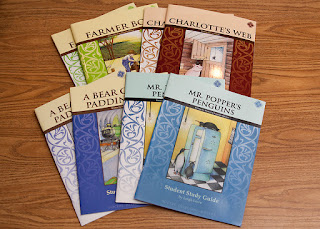What is the Third Grade Literature Guide Set?
The Third Grade Literature Guide Set from Memoria Press includes a Teacher Guide and a Student Study Guide for 4 different grade level appropriate books. There is an option to buy the novels as well, but you can buy just the guides if you already own the chapter books. You can also purchase the guides for one book if you don't want to do the full set. The 4 titles in the third grade set are:- Farmer Boy by Laura Ingalls Wilder
- Charlotte's Web by E. B. White
- A Bear Called Paddington by Michael Bond
- Mr. Popper's Penguins by Richard and Florence Atwater
 | |
| Memoria Press Third Grade Literature Guide Set |
The guides are organized by chapter, with reviews added every so often. Each chapter has 2 pages with sections for vocabulary, comprehension, discussion, and writing, allowing the student to develop vocabulary and comprehension skills as well as learn to ask themselves questions that create a deeper understanding of what is being read.
 |
| A test |
 Charlotte's Web, Farmer Boy, and A Bear Called Paddington are laid out the same. A Bear Called Paddington and Mr. Popper's Penguins are shorter study guides. Mr. Popper's Penguins doesn't have the discussion sections, and instead of Enrichment, it includes an Activity section. The section with new words is swapped for a Pronounce & Spell section. It has Honors Activities every few chapters instead of Reviews, and no tests. These Activity sections prompt for more research on things like penguins, the north and south pole, and Captain Cook's route. With each guide expected to take 6-7 weeks, these would provide a full year of reading studies.
Charlotte's Web, Farmer Boy, and A Bear Called Paddington are laid out the same. A Bear Called Paddington and Mr. Popper's Penguins are shorter study guides. Mr. Popper's Penguins doesn't have the discussion sections, and instead of Enrichment, it includes an Activity section. The section with new words is swapped for a Pronounce & Spell section. It has Honors Activities every few chapters instead of Reviews, and no tests. These Activity sections prompt for more research on things like penguins, the north and south pole, and Captain Cook's route. With each guide expected to take 6-7 weeks, these would provide a full year of reading studies.In Farmer Boy I found sections teaching more literary techniques such as simile, alliteration, onomatopoeia, and dialogue. There are opportunities to draw out the sequence of events, and instructions to draw the farm on paper to help you understand it better. A Bear Called Paddington includes map work. Overall, the study guides cover a wide variety of topics that I am pleased with. These are all things I know my daughter will love to learn about.
How did we use it?
 | |
| Charlotte's Web Literature Guide |
My daughter chose to start with Charlotte's Web. We are using the 3rd grade set even though she is in 2nd grade. Her reading level is advanced, but I don't like pushing too far ahead when we are focusing on comprehension and vocabulary building. I have been pleased with this set for her.
The instructions with the guides give ideas for how to use them. I like the suggestion in the 3rd grade set of having the child form answers/sentences out loud before writing them. The instructions also suggest switching between the parent writing an answer and the student taking a turn. This is perfect for this age level.
 |
| Chapter 9 Teacher Guide |
On day 2 we do the pages in the study guide, filling in the vocabulary, and answering the comprehension questions. If we need to look back having the page number there helps. If there's more to an answer than she has remembered I'll say, "Let's read that page again and see if there's anything else that would help us here." We move on to the second page for that chapter and discuss the quotations and what was happening at that point in the story. Then we do the discussion questions. The last section is Enrichment, which has a variety of activities to further understanding of the story, to relate to ourselves, or to build writing skills. My daughter says enrichment is her favorite part. The teachers guide has the answers if you need help. Each chapter takes us two days, but you can pace this faster or slower according to what works best for your family. At first my daughter felt like this was a slow way to read the book but as we go she is enjoying it more and more, and doesn't mind only reading one chapter at a time.
Will we continue to use it?
My daughter likes these literature guides more than I expected. She wants to start A Bear Called Paddington next. I have enjoyed watching her begin to use the vocabulary words she's learned. She was picking a dessert one day and I overheard her say "He's appealing to your stomach!", which is a quote from Charlotte's Web. Appealing was a vocabulary word and she sprinkles these words into her conversations now. I appreciate that she is learning to think more deeply about what she's reading. I have always wondered about a good way to incorporate reading comprehension into our schoolwork and I feel like this is it. The classical literature choices are my favorites, and Memoria Press has many available over all grade levels. I am considering purchasing some for my older kids as well. I am so glad we got the chance to review this set!Where to find Memoria Press:






No comments:
Post a Comment